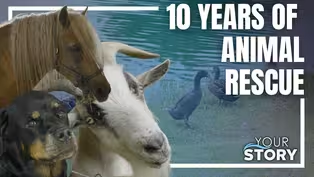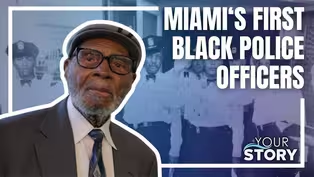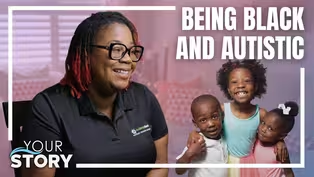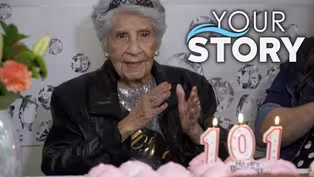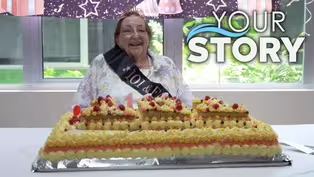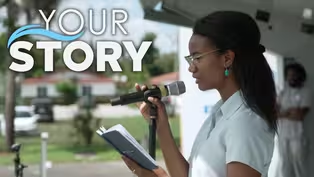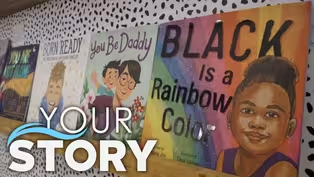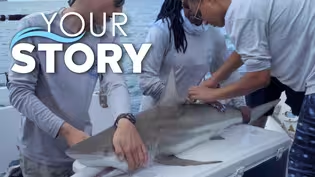South Florida PBS Presents
Exploring One of the Largest LGBTQ+ Archives and Libraries
Special | 8m 51sVideo has Closed Captions
We profile Stonewall National Museum and Archives, one of the largest of it's kind.
Stonewall National Museum and Archives is one of the largest gay archives and libraries in the United States. It’s now almost 50 years old and resides in Fort Lauderdale, Florida. Executive director Robert Kesten sits down with us to discuss his career in human rights activism and what led him to find Stonewall National Museum.
Problems playing video? | Closed Captioning Feedback
Problems playing video? | Closed Captioning Feedback
South Florida PBS Presents is a local public television program presented by WPBT
South Florida PBS Presents
Exploring One of the Largest LGBTQ+ Archives and Libraries
Special | 8m 51sVideo has Closed Captions
Stonewall National Museum and Archives is one of the largest gay archives and libraries in the United States. It’s now almost 50 years old and resides in Fort Lauderdale, Florida. Executive director Robert Kesten sits down with us to discuss his career in human rights activism and what led him to find Stonewall National Museum.
Problems playing video? | Closed Captioning Feedback
How to Watch South Florida PBS Presents
South Florida PBS Presents is available to stream on pbs.org and the free PBS App, available on iPhone, Apple TV, Android TV, Android smartphones, Amazon Fire TV, Amazon Fire Tablet, Roku, Samsung Smart TV, and Vizio.
Providing Support for PBS.org
Learn Moreabout PBS online sponsorshipMore from This Collection
South Florida PBS digital series showcasing South Florida people and organizations.
How Barky Pines Animal Rescue in Loxahatchee is Saving Lives!
Video has Closed Captions
Go behind the scenes with Barky Pines Animal Rescue. (5m 17s)
The Forgotten History of Miami’s First Black Police Officers
Video has Closed Captions
Beyond Overtown’s vibrant street art and cultural spots lies an overlooked piece of Miami history. (10m 26s)
A Black Family’s Journey with Autism
Video has Closed Captions
Meet Maria Davis-Pierre and her neurodiverse family. (7m 40s)
Meet 101-Year-Old Doctor Gladys Lopez
Video has Closed Captions
An avid reader, traveler and doctor, Gladys Lopez has lived many lives in many places. (4m 37s)
Meet 101-Year-Old Miamian Mercedes Garcia
Video has Closed Captions
Mercedes Garcia’s resilient story is like that of so many Miamians. (4m 20s)
Finding Your Voice with Art Prevails Project
Video has Closed Captions
Art Prevails Project based in South Florida, offers creative outlets for the community. (5m 9s)
Celebrating Diverse Children’s Books at Rohi’s Readery
Video has Closed Captions
Rohi’s Readery is a children’s bookstore in West Palm Beach. (4m 22s)
Minorities in Shark Sciences (MISS) is Making Waves
Video has Closed Captions
Meet four black female marine scientists that are making waves in shark science. (8m 40s)
Providing Support for PBS.org
Learn Moreabout PBS online sponsorshipI'm Robert Kesten.
I'm executive director of Stonewall National Museum and Archives, which is one of the largest museums, archives and libraries in the LGBTQ community nationwide.
Over my shoulder is part of the 28,000 volume library and I'm facing one of the exhibits that is now going on and then around the corner is another exhibit and then beyond that are the archives and in the archives, we have well over six million articles that trace the history of the LGBTQ+ movement.
For many years, I've been working on global human rights issues so I've spent time in the former Soviet Union.
I've spent time in the Middle East during conflicts there, in Asia, in Africa and always utilizing the tool of the Universal Declaration of Human Rights and ultimately that tool drove me to come to Florida.
For one reason, Eleanor Roosevelt, who is a former first lady and also our first ambassador to the United Nations, chaired the Universal Declaration of Human Rights Committee.
It ended up that she spent vacations in Sarasota from the 1930s to the 1960s and when she was there, she would go into the schools and talk about the Universal Declaration of Human Rights.
I carry with me a pair of cast shoes that belonged to Eleanor Roosevelt, reminding me that you always have to walk in someone else's shoes before you make any judgments.
While in Sarasota, I was surprised that there was an opening here and then I was offered the position and brought that human rights experience, that activism experience here to Fort Lauderdale and to Stonewall.
The overall mission of the museum is to bring history to life, to use history as a way of learning the lessons that help us not make the mistakes that we've made over and over and over again, by using history as a tool, by demonstrating where we did learn, where we didn't learn.
And our agenda is to make sure that everybody's story gets told, that we don't just focus on one part of the population, but focus on everybody who makes up this community and what's interesting is that the LGBTQ+ community is the only community that includes bits and pieces of every other community.
If you're Catholic, you're Catholic.
If you're Jewish, you're Jewish.
If you're Greek, you're Greek, but in all of those cases, you will find members of the LGBTQ+ community and so it should be a melting pot and it should be a place where we can form alliances and it should be a place where we build a more positive world, but because of that, it also becomes a target of those who believe in dividing and separating.
When I first started here, my development director and my chair of my development committee said that they wanted to do a women's event, which I thought was a brilliant idea and something that we had to do, but I thought that we needed to go at least one step further and it shouldn't have been about a single event but the creation of a Woman's Fund, so that we could have parody in the archives and in the library and in our programming for women and men and I think that that in and of itself, the act of doing that will create an awareness that we lack and will tell an important part of the missing piece, not only of the LGBTQ community's story, not only of the trans women's story, but also of the allies.
The Elizabeth Taylor's, the Mathilde Krim's, the Judith Light's who have stood up time and time again for this community because they know that this community represents potentially everybody.
We have six million documents that show why silence equals death as they said during the AIDS crisis and as we can say now.
I won't say that history repeats itself.
I would say that it's an ongoing cycle and until that cycle is broken, we will continue to do the same things over and over again even if we expect different results.
Our job as a place that holds information, that holds thousands of books, that holds millions of records in the archive is to bring that to life, to make sure that people learn those lessons so that the history will not continue in a cycle of degradation and defeating the dignity of every human being.
The only way to do that is to make sure that every single story is told.
There are a few things that are more important than ensuring that the next generation has the information they need to do what is right, to be on the right side of history, so our doors are always open to young people.
And in fact just the other day, a father brought in his daughter and she was intrigued to be in a space that finally spoke to her.
You can see the joy in the parent and the grandparent's face as their child, grandchild finds a place where they are not only welcome but can find things that look like them and we want to do that for everyone and we have the materials here, whether you're male or female or they or them, whatever you see yourself as you can find it here.
Anyone who comes in this door should walk out this door feeling better about themselves and better about the world that they live in, knowing that they can make an important contribution, that the world, the future of the world rests to some extent on their ability to carry it forward, so young people are more than welcome here.
We're hoping that the new laws in the state don't prevent that from happening and that schools will take advantage of all that we have to offer because this is an important piece of American history.
And why do I say that because if you look at all the artists, all the designers, all the scientists, all the business people that are members of this community, you see the impact this community has had on the world and certainly on the United States of America and you saw what was taken away during the AIDS crisis when so many of those great talents died from an illness that probably could have been treated earlier if people in power were willing to act, but because they weren't many people died, but because of that the community organized and allies showed up and there was Elizabeth Taylor and there was Doris Day and there were all these iconic figures, representing the very straight world coming to the aid of people who they knew and respected because of their talents and contributions.
And that's the message that we need to carry out there, that we are not some pariah that's out to destroy but we are contributors that want to enhance the quality of life for everyone.
We want this to become the village green, not only for people in Fort Lauderdale, in South Florida but for the nation, to know that you can come here, you can get the information that you need without bias.
You will not be judged because of who you love or who you like or who you want to spend time with.
You will always be welcome and the information will always be available to you.
Support for PBS provided by:
South Florida PBS Presents is a local public television program presented by WPBT
